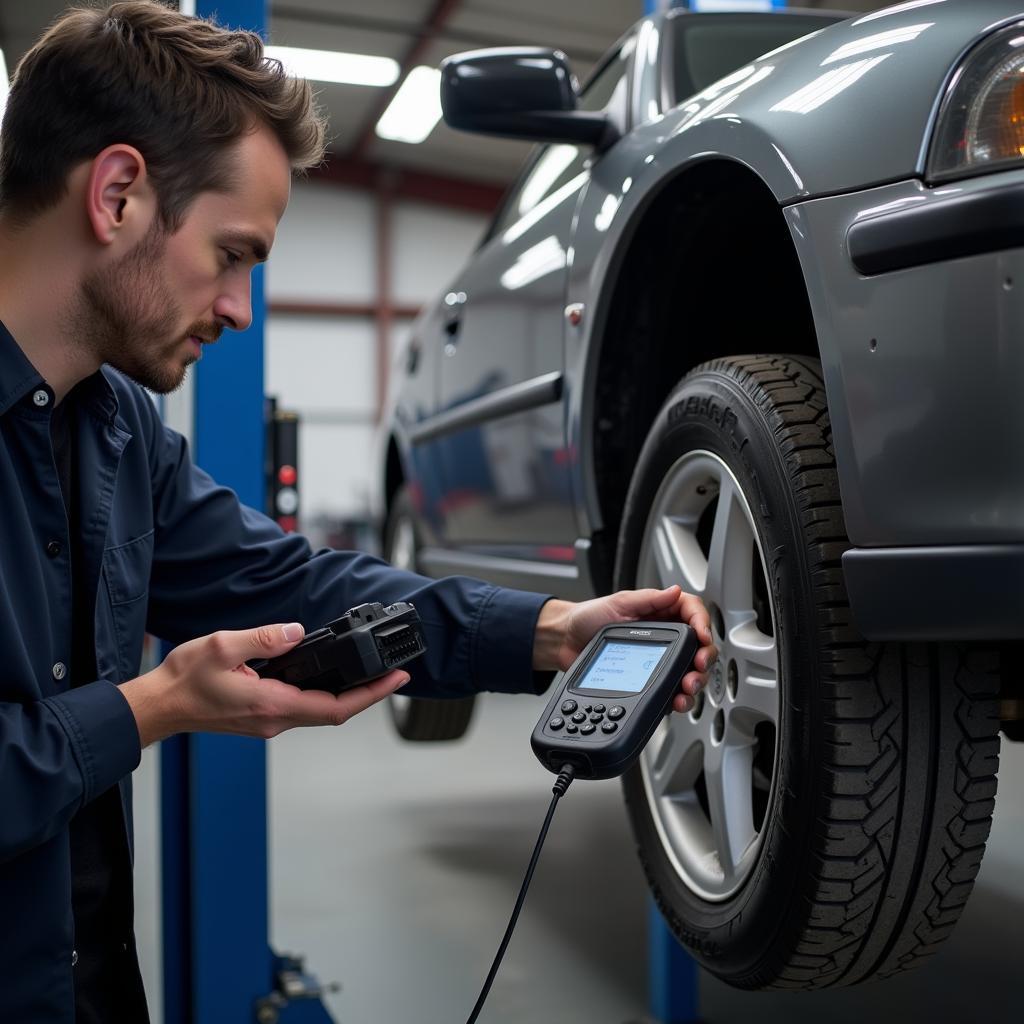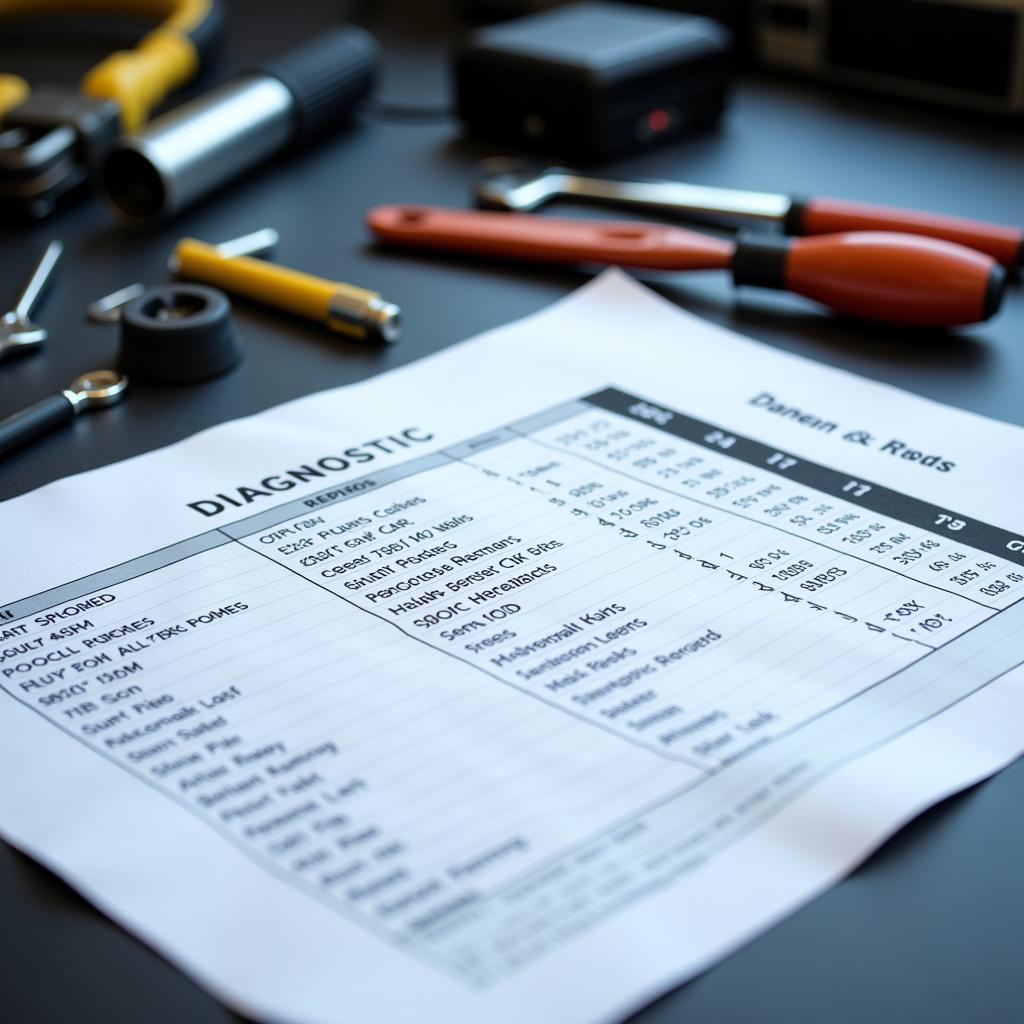Knowing how long a diagnostic car test takes is essential for planning your day and understanding the potential costs involved. While the answer isn’t always straightforward, this article will provide you with all the information you need to estimate the duration of your next car diagnostic test.
Factors Influencing Diagnostic Test Duration
The time it takes to perform a diagnostic car test can vary depending on several factors:
- Complexity of the issue: A simple sensor reading might only take a few minutes, while diagnosing a complex electrical problem could require several hours.
- Type of scanner: Basic OBD-II scanners are quick but may not access all vehicle systems. Advanced scanners used by mechanics provide more detailed information but can take longer to complete the diagnosis.
- Mechanic’s experience: An experienced mechanic can often identify problems faster than someone less familiar with the specific vehicle or issue.
- Vehicle make and model: Some car manufacturers have more complex systems than others, potentially impacting the diagnostic time.
 Mechanic connecting a diagnostic tool to a car’s OBD-II port
Mechanic connecting a diagnostic tool to a car’s OBD-II port
Typical Diagnostic Test Times
While providing an exact timeframe is impossible without knowing the specifics of your situation, here are some general guidelines:
- Basic OBD-II scan: 15-30 minutes. This type of scan reads and clears basic fault codes, giving you a general idea of the issue.
- Comprehensive diagnostic test: 1-2 hours. This involves a more in-depth analysis of your car’s systems and may include visual inspections, component testing, and road testing.
- Complex issue diagnosis: Several hours or even days. This is more common with intermittent problems or issues requiring extensive troubleshooting.
Expert Insight: “It’s important to remember that a diagnostic test is just the first step in resolving a car issue,” says John Miller, a seasoned automotive engineer at DiagFixPro. “Once the problem is identified, the actual repair time can vary significantly depending on the nature of the issue and the availability of parts.”
Understanding Diagnostic Test Costs
Diagnostic test costs can range from free at some auto parts stores to $100 or more at dealerships and independent garages. The price usually depends on the complexity of the test, the equipment used, the mechanic’s hourly rate, and the shop’s location.
What Happens During a Diagnostic Test?
During a car diagnostic test, the mechanic will typically:
- Connect a scan tool to your car’s OBD-II port. This port allows access to the vehicle’s computer system and stored fault codes.
- Read and interpret fault codes. These codes provide clues about potential problems within specific systems.
- Perform visual inspections. The mechanic will visually examine the vehicle for obvious signs of damage or wear and tear.
- Test components. Depending on the suspected issue, the mechanic might test individual components for proper function.
- Road test (if necessary). A road test allows the mechanic to experience the problem firsthand and gather more information.
 A printed car diagnostic report displaying a list of fault codes
A printed car diagnostic report displaying a list of fault codes
Want to learn more about what a diagnostic test can tell you about your car? Check out our comprehensive guide: what does a diagnostic test tell you about your car.
Tips for a Faster Diagnostic Test
- Be prepared: Have your car’s maintenance records handy and provide a detailed description of the problem.
- Choose the right mechanic: Opt for a mechanic specializing in your vehicle’s make and model or one experienced in diagnosing similar issues.
- Ask about the estimated time: Inquire about the expected duration of the test upfront to plan accordingly.
Conclusion
While the exact duration of a diagnostic car test can be unpredictable, understanding the factors involved can help you estimate the time commitment and potential costs. Remember to choose a reputable mechanic and be prepared to provide detailed information about the issues you’re experiencing for the most accurate and efficient diagnosis.
FAQs
1. Is a diagnostic test always necessary?
While not always mandatory, a diagnostic test is highly recommended when your car experiences problems. It helps pinpoint the root cause, saving you time and money on unnecessary repairs.
2. Can I perform a diagnostic test myself?
Yes, basic OBD-II scanners are available for DIY enthusiasts. However, these scanners might not offer the same depth of information as professional-grade equipment.
3. What if the diagnostic test doesn’t find a problem?
If the diagnostic test doesn’t reveal any issues, the mechanic may need to perform further investigation. This could involve road testing, visual inspections, or consulting with other specialists.
4. Can I drive my car with a check engine light on?
While you can sometimes drive short distances with the check engine light on, it’s crucial to have the issue diagnosed promptly. Ignoring the warning light can lead to further damage and costlier repairs down the line.
5. What is the difference between a diagnostic test and an inspection?
A diagnostic test focuses on identifying the root cause of a specific car problem, while an inspection is a more general assessment of your vehicle’s overall condition and safety.
Need to find a reliable place for your car diagnostic test? Discover where to get a car diagnostic test done with our helpful guide: where to get a car diagnostic test done.
Interested in learning more about car diagnostics? Explore our website for additional resources: who does diagnostic test on cars.
Facing challenges with resetting your car diagnostic monitors? Our detailed guide can provide the answers you need: how to reset car diagnostic monitors.
Looking for information on where to run a diagnostic on your car? Find all the answers you need here: where can i run a diagnostic on my car.
Need immediate assistance with your car diagnostic concerns?
Contact our expert team via WhatsApp: +1(641)206-8880, or Email: [email protected].
We’re available 24/7 to provide you with the support you need.

Leave a Reply